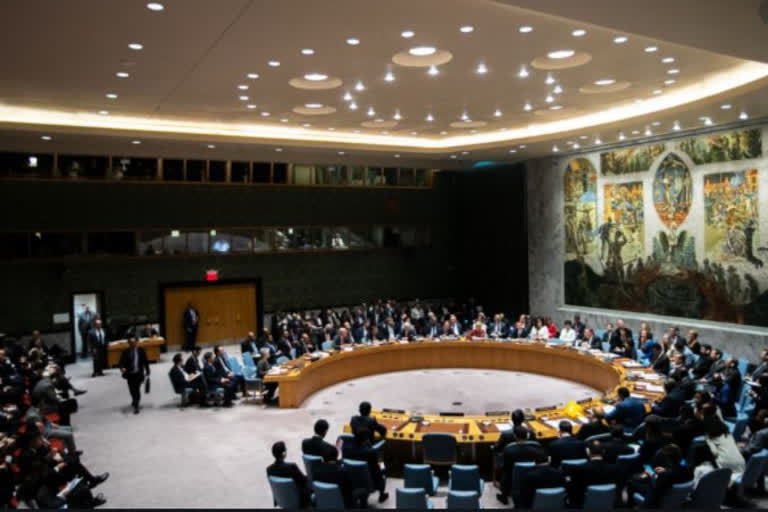New Delhi: As India begins its two-year tenure as a non-permanent member of the United Nations Security Council, expectations are set high as experts told ETV Bharat that India’s two-year tenure ship will set the direction of India’s foreign policy.
To mark the event of India's tenure ship in the UNSC which is considered to be a challenging one, India's permanent representative to UN Ambassador TS Tirumurti will install the Indian tricolour under secret surveillance at a special ceremony on Monday- the tradition which was first introduced by Kazakhstan in the year 2018 and backed by all 15 UNSC members as an annual ceremony of the Security Council.
Speaking to ETV Bharat, former ambassador Jitendra Kumar Tripathi said, “Installation of the flag is a new ritual that has been introduced by Kazakhstan in Security Council. Therefore, India also started it.
He says, “Now that India has joined the UNSC, it has ample issues to focus on. Firstly, India will focus on counter-terrorism and how to curtail them. Secondly, when India was a member in Security Council during 2011-2012, it brought a proposal for Comprehensive Conference on International Terrorism (CCIT) and during its Presidency; India introduced a concept of zero tolerance to terror.
Therefore, India will focus on CCIT, which was proposed in 1996 and India was supportive of it. India will try to see that some concrete progress is made in this regard so that CCIT can be held as soon as possible to formulate clear cut view and intention about eradicating terrorism”.
Also Read: French Ambassador welcomes India's new stint at UNSC
Ex Diplomat G Parthasarathy further said, “The installation of the flag is symbolic of India being one of the members who will be involved in discussing security issues in the UN.
“The reality is that the five permanent members of the UNSC have veto power and therefore, it will be difficult to get the resolution passed. But generally, India has been working in consensus to get the resolution accepted by consensus so that nobody opposes it. So that is really been a roar but India has also been serious on issues like peacekeeping, environment, numerous dispute emerging out of tensions”, he added.
“For instance what happened in Armenia when it was liberated by Azerbaijan, the whole thing was settled between the parties concerned. So there is a lot of work to do but when the problems become larger and we need a consensus, then it goes for a vote. India’s effort has always been to find a consensus and you will find the permanent members arguing with each other. India has generally worked with others to develop a consensus out of that so that we can get some results”, he underlines.
The ceremony of installation of the flag is considered to be significant as the international community provides the mandate to the member countries to fulfil the important and responsible task of maintaining global and security.
India has time and again reiterated its stance on reformed multilateralism, effective global governance at various global forums.
“UNSC is a very useful organization for maintaining world peace; stability and see that things are discussed in the open so that there is some form of resolution, but again it is necessary to have a consensus. The success of UN diplomacy is to be able to forge a ‘consensus’ which nobody can oppose for various reasons, at least amongst the permanent members of the UNSC”, Parthasarthy points out.
“India has been elected this year for the 8th time. India had been the member for two-year tenure in UNSC for seven times earlier. This is perhaps one of the few times that both India and Pakistan are the members of the Security Council". Tripathi further highlighted.
Earlier, the Ministry of External Affairs (MEA) took to Twitter to share a video of top officers speaking about India's approach and priorities for the UNSC.
-
Team @IndiaUNNewYork gears up for India’s term @UN Security Council (2021-22)
— India at UN, NY (@IndiaUNNewYork) January 3, 2021 " class="align-text-top noRightClick twitterSection" data="
Meet officers speak about India’s approach and priorities for #UNSC. ⤵️
Come, be part of India’s journey for the next two years.@MEAIndia @MOS_MEA @DrSJaishankar @harshvshringla pic.twitter.com/4rL20h4S0W
">Team @IndiaUNNewYork gears up for India’s term @UN Security Council (2021-22)
— India at UN, NY (@IndiaUNNewYork) January 3, 2021
Meet officers speak about India’s approach and priorities for #UNSC. ⤵️
Come, be part of India’s journey for the next two years.@MEAIndia @MOS_MEA @DrSJaishankar @harshvshringla pic.twitter.com/4rL20h4S0WTeam @IndiaUNNewYork gears up for India’s term @UN Security Council (2021-22)
— India at UN, NY (@IndiaUNNewYork) January 3, 2021
Meet officers speak about India’s approach and priorities for #UNSC. ⤵️
Come, be part of India’s journey for the next two years.@MEAIndia @MOS_MEA @DrSJaishankar @harshvshringla pic.twitter.com/4rL20h4S0W
“Like the changing of the guards, it is the changing of flags from outgoing to the newly elected members. This solemn ceremony serves the purpose of affirming and respecting the new members with the recognition they deserve,” Kazakhstan’s former Permanent Representative to the UN Kairat Umarov had said during the 2019 ceremony.
Along with India, the incoming UNSC members Norway, Kenya, Ireland and Mexico will join non-permanent members Estonia, Niger, Saint Vincent and the Grenadines, Tunisia and Vietnam and the five permanent members China, France, Russia, the UK and the US.
Since the presidency of the UNSC is held by each of the members in turn for one month, India will preside over the council as UNSC President in August 2021 and again in 2022.
(With inputs from agencies)



